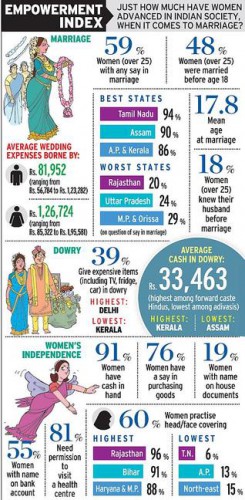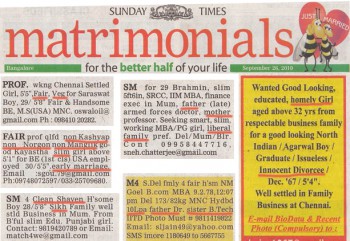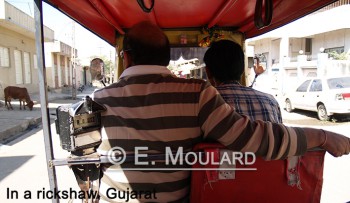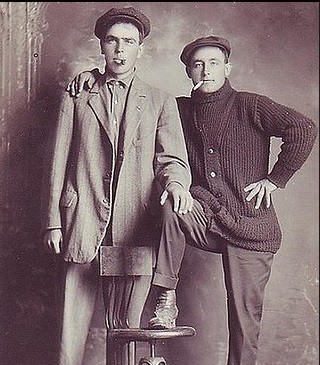04/16/2014
The Indian wedding for Dummies - 2. Finding a suitor
The "Indian wedding" (I should say the Hindu wedding to be exact) has made the subject of numerous books, movies, visits to India. In short it’s an institution. I will try here to understand something to it!
When it is decided to put such son or such daughter on the market, the family prepare a resume and letter of motivation – I'm not kidding, my ex-boyfriend was super happy when he received a spontaneous application even though 1. He was not officially “available” for marriage and 2. He thought his reputation was ruined because he was dating a foreigner.
Then they activate social networks (and here I am not speaking of facebook but of the original networks, which have incredible proportions among Indians, who are able to talk to anyone anywhere and make friends in five minutes.
There is also the tradition of the nayan, the matchmaker (source) It is usually a friend or a distant relative, neutral, having a talent as a recruiter (to find the unique one) and as a negotiator (to succeed in having both parties agreeing to the “terms” of the marriage (although the dowry is illegal in India since 1961, it is commonplace that the family “buys” the guy – I gift you a nice car if (please, please, please) you marry my daughter).
They also publish matrimonial ads in newspapers:
Today they also register on marriage websites.
The family astrologer is also involved. While we are at it, you should know that in India, the astrologer isn't considered as a charlatan but rather as a pillar in the life of every good Hindu: birth first, marriage then (that's why on invitation cards, the time is very precise, like 9:46 AM; is not a typo mistake but the exact time when the starts will cross path!) and then at any other important moment. For instance, one of my best managers shifted his interview for a few days, so that the planets would be aligned. So be it. Hindus even grant astrologers with the benefit of mistakes and don’t hesitate to consult several experts to get the real truth. Astrologers are also a bit magicians because when the alignment is messed up, they have the chance to correct it. So sometimes the horoscopes of a couple don’t match and the horoscope the bride predicts that her first husband will die young (she is called manglik). The trick is to marry her to a tree or an earthen pot, which then are destroyed (or immerged for the second), leaving her a widow, and free to remarry without bringing bad luck to her human husband. It has happened to some of my friends... And here's a great post by an Indian blogger on this rite (pdf) and incidentally on all her experiences as a modern dating Indian girl (blog).
08:00 Posted in Incredible India!, Why in India... | Permalink | Comments (0) | Tags: india, marriage, wedding, arranged marriage, forced marriage, love marriage, rites, ceremonies, rituals, divorce, sheet, mehndi, henna, baraat, sex, incompatibility, contract, classifieds, matrimonials, matchmaker, nayan, astrologers, horoscope, marry a tree, marry a pot, auspicious, date, joint family, kama sutra | ![]() Facebook | |
Facebook | |
04/14/2014
The Indian wedding for Dummies - 1. The arranged marriage
The "Indian wedding" (I should say the Hindu wedding to be exact) has made the subject of numerous books, movies, visits to India. In short it’s an institution. I will try here to understand something to it!
Arranged marriage: and why not?!
Let's make the distinction between arranged marriage and forced marriage.
 If I can de-dramatize arranged marriages (read below), it is impossible to do the same with forced marriages which are still widely practiced in India: 40% of women do not have a word in the choice of the husband, less than 20% of women (over 25) knew their husbands before the fateful day and worse, almost 50% of women have married before the legal age of 18 (source).
If I can de-dramatize arranged marriages (read below), it is impossible to do the same with forced marriages which are still widely practiced in India: 40% of women do not have a word in the choice of the husband, less than 20% of women (over 25) knew their husbands before the fateful day and worse, almost 50% of women have married before the legal age of 18 (source).
Which means that there are still thousands of people (Hindus) who, each year, follow the tradition and find out whom they are going spend the rest of their lives with only when they are already married: SURPRISE! As per the custom to groom arrives first, and his view is hidden with a bed sheet, which is removed once the bride is brought in by her maternal uncle and cousins and the consent of the parents exchanged. The bed sheet is simply a less sexy version (but more promising ;)) of the veil used in Catholic marriages, originally to hide the face of the bride (source).
The concept of arranged marriage, still very prevalent in India (more than 90% of cases), tends to shock the Westerners. Before crying wolf and saying Indians are horrible, remember that from the time of Ancient Rome to the 19th century (i.e. 2 500 small years), the marriage of convenience was the norm in our civilization. The family was then a “business of social or economic survival” and marriage a “contract” to ensure its sustainability*.
What about love in an arranged marriage? When a Westerner thinks of arranged marriage, he immediately gets the image of a pretty girl forced to marry a loser, too ugly and too stupid to find a woman by himself! While in fact, parents seek someone who matches as much as possible – and we can assume that they know their offspring pretty well! And the candidate has a whole lot of criteria to fill: religion, caste, skin colour (fairness being an essential criterion of beauty), income, location, diet (non-vegetarien vs vegetarian), horoscope to mention only but the most important.
Whatever said and done, it is likely that two “virgins of love”, that many things draw close (see above-mentioned criteria), which have been waiting for it since childhood, end up loving each other (they so want it!). The passion, the ignition of the body and desire, is less guaranteed but at the same time it is known to be ephemeral, isn’t it? ;)
Let's be honest: who has never felt, while celibacy and the thirties are at their full, as meetings on the Internet have only led to failures (ending up, at best, as entertaining sex buddies), as the stock of single friends’ friends is exhausted, when the anxiety of ending up as a lonely spinster eaten by her cat makes the ball in your throat so big even Häagen-Dazs doesn’t get down anymore : “if only my awesome parents who have (almost) always fulfilled my whims could find me the perfect match!” Who did not want to make this call, unthinkable, and yet potentially life-saving?!
In the same vein, it is a bit hypocritical to criticize arranged marriage when you see the success of online dating sites in the West (in 2007, 1 out of 8 married couple in the US met online! source)).
And then even if it is not written black on white, if it is not man-da-tory, despite our increasingly multicultural environments, we are still largely endogamic – most of my friends have married people from their tribe, and it is certainly easier to manage than for the eccentrics who get a partner from another country, another colour, another religion or another social class. Easier because two endogamic people only have to overcome the differences due to gender and personality and not all the others. But it is also probably less outlandish, enriching and rewarding!
So when you dig a little, you realize that what mostly shocks my fellow Westerners is not so much the “arrangement” itself but rather the idea of not having “tested the goods before purchase”, ending up on the wedding night in bed with an unknown person... I admit that in our culture where sex is ubiquitous, obsessive, glorified, overvalued (?), the idea is off-putting. In addition it is a bad one if I take the example of my (Indian) close friends’ experiences: unconsumed union, weird practices, very often the man is not “up to the mark” and this up till the divorce! Seeing a young couple on honeymoon who has nothing to say to each other in the first days (before things warm up) surprises me every time, and makes me reflect on the oddity (from my point of view) of the situation.
And yet it is still the rule. For the lucky ones, the “choice” to refuse an application is becoming increasingly available. So is the option to introduce someone (from school, from the office) and if the afore-mentioned criteria are met and that the union takes place, it will be called a “love marriage” (even if very often, there is no romantic relationship). Real love marriages, guided by passion and defying the afore-mentioned criteria, remain very rare and often end up in bloodshed (especially in under-privileged backgrounds).
That is why passion is exalted as the Holy Grail (something you dream of but will never get) in the movies, and in families as a trouble maker (the uncontrollable versus the social codes that govern a well-ordered life).
* “It is during the 18th century that the family ceased to be regarded as a business of social survival or economic to rely more and more on the feeling of love [...] The mentioned change was influenced by economic factors such as industrialization, opening markets, wage labour, the progressive improvement of conditions of life, but also by an encouragement of the Church and the State. […] We can see, for example, that today, despite the diversification of modern societies which are often multicultural, a trend quite generalized to contract endogamic marriages; the choice of the partner is often influenced by social origin, ethnic, racial or religious.” Source: http://www.asblcefa.be/cefa/images/pdf/9mariagearrange
“Marriage is first a contract between a man and a woman. Subsequently, free consent developed, and marriage for love gradually override the marriage of convenience during the nineteenth century, in parallel with the evolution of the role of women in society, aimed to being the equal of men. This process culminated with the legalization of divorcein 1884. » Source: http://www.mariages.net/articles/origines-et-histoire-du-mariage--c5102
08:00 Posted in Incredible India!, Why in India... | Permalink | Comments (0) | Tags: india, marriage, wedding, arranged marriage, forced marriage, love marriage, rites, ceremonies, rituals, divorce, sheet, mehndi, henna, baraat, sex, incompatibility, contract, classifieds, matrimonials, matchmaker, nayan, astrologers, horoscope, marry a tree, marry a pot, auspicious, date, joint family, kama sutra | ![]() Facebook | |
Facebook | |
10/16/2013
Why in India men hold hands?
Foreigners are always shocked to see Indian men strolling two by two, hand in hand... And even if I am used to it, seeing my new hired casually leave his hand on the thigh of a colleague he met the same morning, then lie back comfortably and pass his arm over the shoulders of the other guy, it still felt weird.
It is all the more surprising that men don’t behave like this with women at all…
So the first thing that comes to mind is that India explodes the ratios of homosexuality... But actually no, they are in the norm (1) (with admittedly a little more guys having ‘circumstantial’ homosexual sex since premarital sex is still a taboo – they do with whatever hole they get before they get married!). It was even considered an offence until 2010, when the Supreme Court observed that live-in relationships and premarital sex was nothing illegal (2). Until then, I remember that some hotels did not let us sleep together, my ex-favorite Indian and I, because we were not married and that the police could come down and arrest us for prostitution...
Similarly, the law does not specifically prohibit public displays of affection: the Penal Code of 1860 stipulates that “whoever, to the annoyance of others, does any obscene act in any public place, shall be punished with imprisonment of either description for a term which may extend to three months, or with fine, or with both” (3). But there is nowhere a definition of obscenity... (4).
The fact that it is legal doesn’t mean that it is morally well-accepted (5). It is even quite condemned... And the mentalities are changing, but not very fast... For example, more and more young people lose their virginity before marriage but they are forced to have sex in parks or on building roofs since it is out of question to bring someone of the opposite gender to your room...
Indians have a particular concept of ‘vital space’: it simply doesn’t mean anything. How many have I had a neighbour on a plane invading my space by overflowing the armrest? How many Indians sit on the lap of strangers in overcrowded buses or trains and it doesn’t bother anyone? How many families sleep six or more in a single room? Go try explaining the concept of ‘vital space’ in overpopulated cities... And what good would it do to them anyway?
And to make it simple, they like human contact. Period.
And if you look well, it’s been only a few decades than Western males no longer have much physical contact. This phenomenon would be linked to the rise of homophobia.
At the end of the nineteenth century, homosexuality began to emerge as an identity rather than just a practice: it evolved from something you would do (through the sexual act) to something you would be (a homosexual). Gradually homosexuals attracted more and more suspicion which culminated in a witch-hunt in the 1950s. And the more threatening homosexuals appeared the more that male bodies drifted apart: straight guys wanted to make sure that no one would believe they were gay. “The paranoia had replaced public affection.” (6)
Photo: www.artofmanliness.com
(1) http://www.indiansamourai.com/search/homosexualit%C3%A9
(3) Section 294 (a) of the Indian Penal Code, 1860
(4) The word 'obscene' has not been defined in the code. The laws are vague in that no. specific definition is laid down which could lead to arbitrary interpretation and in gross violation of freedom of expression enshrined in the Constitution of India
08:00 Posted in Why in India... | Permalink | Comments (0) | Tags: india, sex, public display of affection, pda, kiss, hug, vital space, homosexuality, holding hands | ![]() Facebook | |
Facebook | |

















